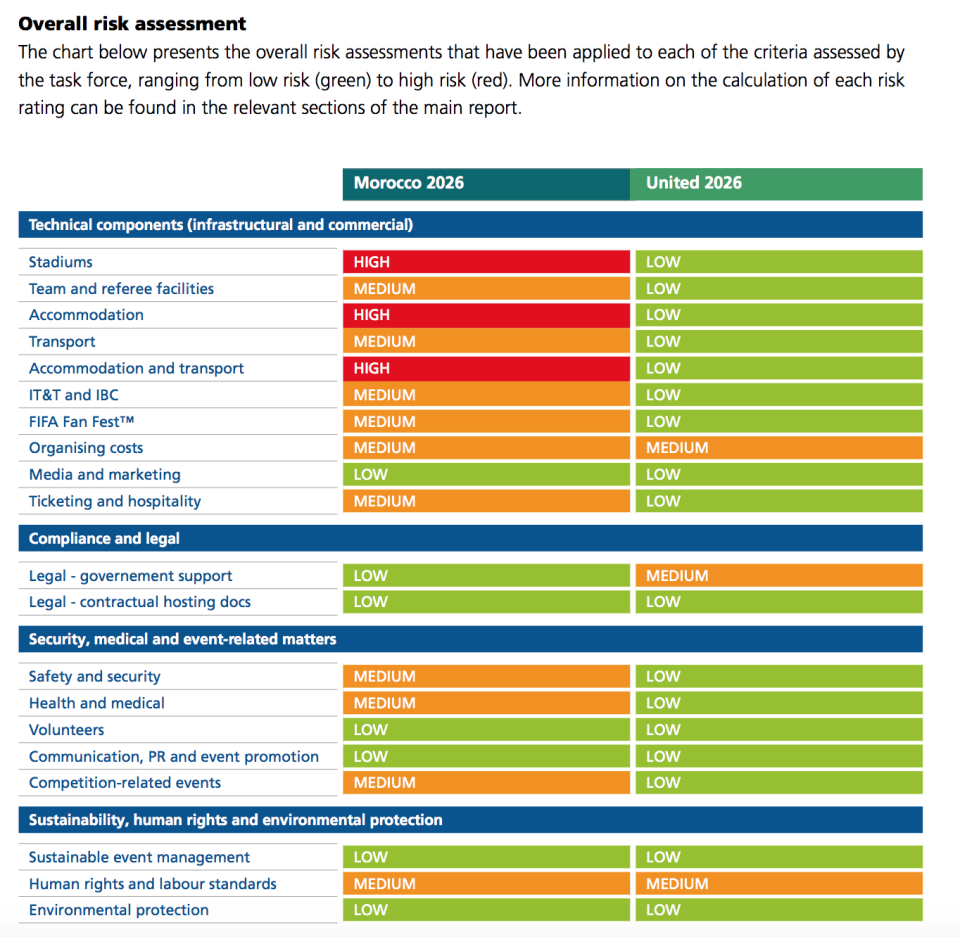FIFA favors U.S.-led 2026 World Cup bid, but Trump policy brings 'significant risks'

There will be a head-to-head battle for the right to host the 2026 men’s World Cup. There will be a June 13 vote. FIFA gave it the green light on Friday by releasing official inspection reports, which gave both Morocco’s bid and the U.S.-led North American bid passing grades.
But one passed with flying colors. The other passed hesitantly, despite concerns. Of 20 assessment criteria, the United Bid was granted a “low-risk” label on 17, and “medium-risk” on the other three. Morocco had 10 areas of medium-risk and three areas of high-risk.
Out of 500 possible points, the United Bid – the U.S., Canada and Mexico – scored a 402. Morocco scored a 275. FIFA’s preference, and its message, are clear: The 2026 World Cup should be on its way to North America. The United bid “has a clear lead” in key areas.
But FIFA’s preference might not matter.
Do the inspection reports affect the vote?
Not necessarily. Because the inspectors aren’t the ones who vote. Soccer officials from 207 nations – one vote per FIFA member – will make the decision. And they’re not beholden to any 500-point scale or “medium-risk” designations. Qatar won 2022 hosting rights despite many of those.
The inspection merely ensured that the vote, held at the FIFA Congress on the eve of the 2018 World Cup, would go ahead. Both bids, the report stated, “met (or exceeded) the minimum hosting requirements.”
So Morocco is in with a very good chance. Because for the most part, 2026 hosting rights will be awarded based on soccer politics, not merit.
What makes Morocco’s bid inferior?
The United Bid’s main advantage is infrastructure. Of the 23 stadiums it proposed, 17 would be ready to host a World Cup match next month, with “no major renovation required.” Six would need renovation.
Of the 14 stadiums Morocco has included in its bid, on the other hand, only five exist – and all would need major renovations. Nine are merely hypothetical. They don’t currently exist, but are instead essentially promises that construction will begin if Morocco wins the bid.
“The amount of new infrastructure required for the Morocco 2026 bid to become reality cannot be overstated,” the inspectors wrote in their report.
That’s why stadiums, accommodation, and accommodation and transport were the three areas in which the Moroccan bid was branded “high risk”:

Concern’s about Morocco’s capacity to host the tournament are amplified by the fact that 2026 will be the first 48-team World Cup, expanded from the current 32-team format. It will feature 80 games instead of 64, but in roughly the same month-long window.
The U.S.-led bid has also promised revenues $14.3 billion, which almost doubles Morocco’s projection.
And last but not least, Morocco has an anti-LGBT law that would seem to violate FIFA policy.
But none of those things have disqualified Morocco. Only a score below 200 on the 500-point scale would have. The North African nation passed comfortably.
So what’s wrong with the North American bid?
Two of the three “medium-risk” areas were “human rights and labor standards” and “government support.” Those obviously pertain to President Donald Trump.
On the former – specifically, on Trump’s proposed travel ban – the inspectors wrote, “Due to new entry regulations that are currently being proposed in the United States in relation to citizens from certain countries, there are significant risks to discrimination-free entry to the country.”
The U.S. government has assured FIFA that its attempts to implement travel restrictions would not be an issue. And Trump, of course, will not be in office when the 2026 World Cup comes around. But the evaluation task force still regards it as a concern.
Who will win the vote?
It might as well be a 50/50 proposition. The North American bid is better. But anti-American sentiment, exacerbated by Trump is reportedly a drawback. So is the time difference between North American and Europe, not to mention Asia.
The North American bid has the support of South America and Oceania. The Moroccan bid presumably has the support of most, if not all, of Africa. So it will come down to Europe and Asia. And nobody is sure how the bid will play out.
– – – – – – –
Henry Bushnell covers global soccer for Yahoo Sports. Have a tip? Question? Comment? Email him at henrydbushnell@gmail.com, or follow him on Twitter @HenryBushnell, and on Facebook.
More soccer from Yahoo Sports:
• 2018 World Cup preview hub
• Carlos Cordeiro’s first 100 days
• Inside the fascinating evolution of USMNT prospect Keaton Parks
• How Dave Sarachan, amid uncertainty, kick-started USMNT rebuild
• New USMNT generation of ‘clowns, social butterflies’ sprouting


